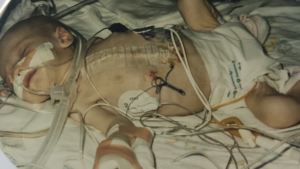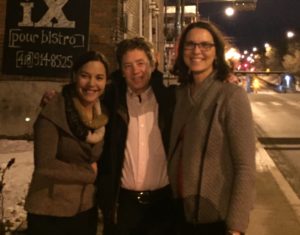Lisa Hemming is a 33 year old CHD survivor and patient advocate. She has Tricuspid Atresia, TGA, ASD, VSD, and Coarctation of the Aorta. She has had four open heart surgeries and multiple medical interventions throughout her life. She is now 30 years post Fontan. This is her story in her own words.
Listen to the MUSTN’TS, Child
Listen to the DON’TS
Listen to the SHOULDN’Ts,
The IMPOSSIBLES, the WON’TS
Listen to the NEVER HAVES
Then listen close to me-
Anything can happen, child
ANYTHING can be
The most important thing that a child can believe is that they can be and do anything they put their minds to. As adults we know that there are limits – rules, laws, physical limitations. As children we are able to believe in anything – including ourselves.

My name is Lisa Hemming and I am a CHD survivor. The poem above, by Shel Silverstein, Listen to the MUSTN’TS has been a favorite of mine since I was very young. Though, at the time, I did not realize how truly topical it was when it came to my own life.
I have the incredible blessing of being born to parents who embody the above Shel Silverstein poem. My parents, who were also my medical advocates, put their faith and efforts into researching – knowing the facts, options, and what to expect. With equal conviction, however, they believe that all of those things don’t always apply.
From the word go, my parents began taking in all of the information they could about my particular heart problem. My mom is much more the advocate-minded person while my dad, the strong silent type, was the perfect emotional support for my situation. In 1989, my mom pushed for me to have the Fontan operation even though some doctors wanted to wait until I was 7 or 8 years old. Acting as my advocate, my mom did her due-diligence and, based on of her research, she believed an un-repaired heart could have serious consequences later in my life. This proactive advocacy proved effective and got me into surgery younger and lighter than most patients. This one act of advocacy has been a huge contributing factor to my overall good health over the years.
For parents who do not have the skill set to be their child’s advocate – I want to say THAT’S OK! It takes great strength to be a parent of a CHD child. Giving your child the gift of an advocate is one of the best things that you can do for them. That does not mean that his or her advocate has to be you. Though my mom and I have a very loving and close relationship, it can require some emotional distance to make the right decisions for a child undergoing any kind of physical turmoil. By giving your child and yourself someone to turn to that can help with the research, details and the medically advanced decision making, you can allow yourself to be present and in the moment with the little person who needs you to tell them that they can BE and DO anything.

Lisa and her parents
Learning everything he could know about my CHD, my dad was and is still able to encourage me, even challenge me, to take part in any activity I am passionate about. Because of his faith – both spiritually and medically – I have not had an entirely different life from anyone else. As a kid I played golf and softball, I played at the park – kickball, tag, and capture the flag, I skied in the mountains (elevation permitting), did water sports, and disappeared for hours in the orchards behind our house to climb trees and have adventures. Of course, those who needed to be in-the-know were told about my heart problem. Teachers, parents of friends, and coaches all knew that sometimes I would get blue lips if I were cold or simply went for a swim. Gym teachers knew that I couldn’t complete the required mile run and that some of the circuit training activities would be beyond me. To me, though, my blue lips were normal and getting out of gym class was a perk that every other kid envied. I liked being different in those ways and in all other ways I felt like any other kid.
Growing up with CHD, I imagine like most children, I have relied on the unconditional encouragement of both of my parents. I also owe my life (and quality of life) to the medical advocacy that was given to my cause. As expected, my parents have both played the roll of encouraging parent and, in turn, of medical advocate. I still see them this way: my mom (my medical advocate) is unyielding in her ability to find answers and to constantly be learning – arming herself with the tools to survive the hardest things that life can throw at her. She keeps my chin up and my curiosity and inquisitiveness alive. My dad is steadfast and I only have to think of him when it feels like life is too exhausting to move forward. He keeps me in competition with myself and confident that nothing is too hard to face if you just have the courage to get up every day and keep going.

Lisa and her husband
As I listed above, I have faced some issues with my heart as I have gotten older. I visit my cardiologist at the University of Michigan once a year – an echo, an EKG, a liver ultrasound, a couple hours of talking to nurses and my doctors about how I’m doing and it’s over. At the moment my numbers all look good and I am a very active and healthy person. I am beginning to feel the difference of a life with CHD now, though. I am unable to have my own kids now (although that was mostly a personal choice), I have palpitations from time to time, I don’t drink alcohol because my liver is already at risk, and my digestion has its own quirks. Having the disorders that I have, I like to know what to expect, and where I stand with everyone else like me. What am I competing with? What should I expect? All of those questions are becoming more relevant as I age. But for now, there are a lot of question marks and it’s “all individual.”
Anything I could say to a family facing CHD can be summed up by Shel Silverstein. We all know where to find numbers and figures and those things are important. We can look at what has happened and what is predicted to happen in the future so that we know what we can expect, but the real truth is: Anything CAN happen. Anything CAN be. If we don’t think of them as limitations, but, instead, think of them as simply guidelines, do our limitations actually exist or could they perhaps be less stringent than we think and all we have to do is believe, like a child, that anything is possible?